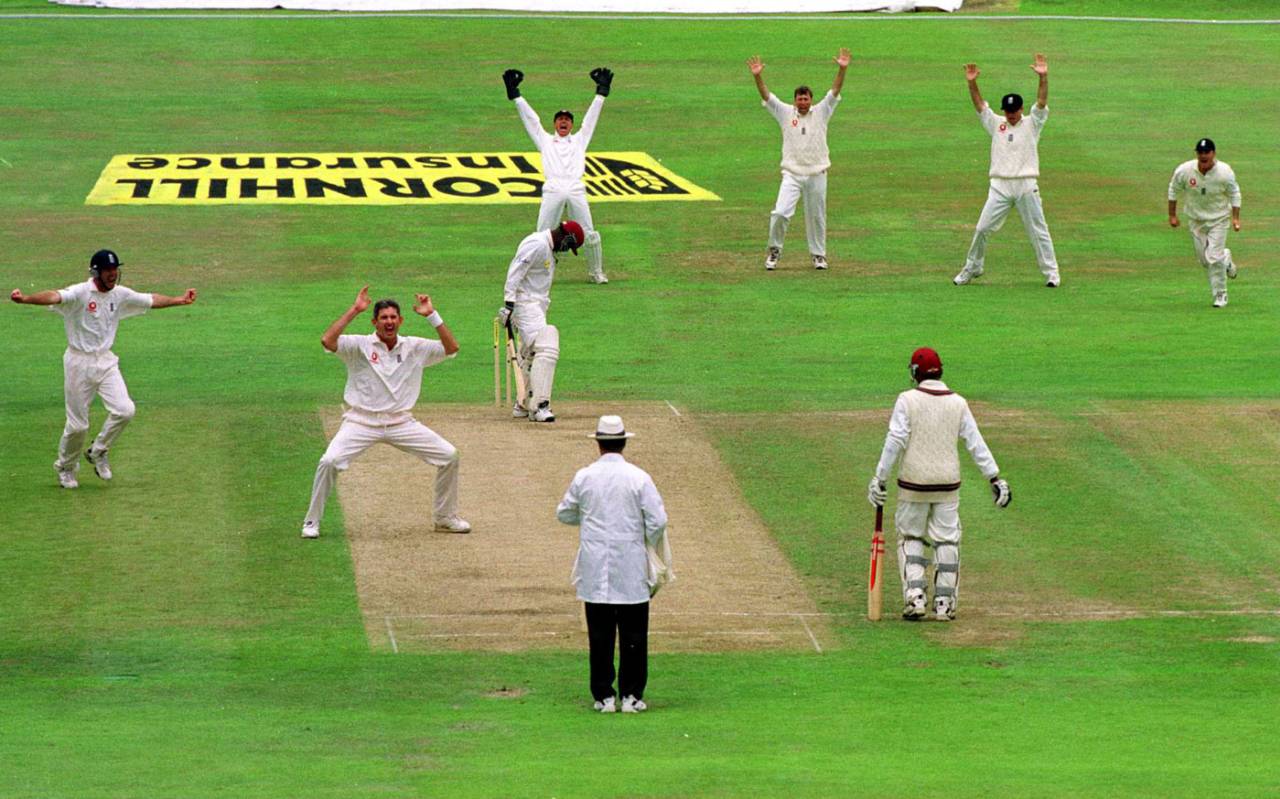Revisiting the glorious summer of 2000
If England need a template for this transitional phase, they can turn the clock back to the series against West Indies at the turn of the century
Alex Bowden
18-Jul-2014

Andy Caddick set Leeds alight with four wickets in one unhinged over in 2000 • Paul McGregor/Getty Images
People are quick to talk about transitional periods these days, but in reality they are chunks of time you can only identify with the benefit of hindsight. After all, even if you always know where you're coming from, it's impossible to state with complete certainty where you're heading. The cynical among you might suggest that the term is merely intended to paint a poor team in a more optimistic light - for I think we can all agree that no one is ever talking about transitioning from a period of success to one of failure.
Looking back, the 2000 Test series between England and West Indies represented a genuine transitional period. In 1999, England had lost at home to New Zealand before having one of their finest-ever winters in 2000-2001, winning Test series in Pakistan and Sri Lanka. A turnabout as striking as that doesn't come out of nowhere and, in the summer of 2000, foundations were built that would continue to support the side in tougher times.
After enduring a number of defeats, one thing that supporters need above all else is hope. Hope achieves two things. It keeps people onside when they might otherwise grow impatient, and it also keeps them watching even when all seems lost. In 2000, credible hope grew from an incredible clatter of wickets.
The first Test had been lost by an innings, so out went Ed Giddins and in came Dominic Cork. He joined Andy Caddick and Darren Gough to form a bowling trio that somewhat surprisingly only played nine Tests together (winning six, drawing one, and losing two). At Lord's these three instigated the kind of transition that England would like us to believe is currently underway. It's striking that they didn't achieve it on a featherbed.
Dismissed for 134 and trailing by 133 after the first innings, England didn't really seem in with much of a chance. However, Gough, Caddick and Cork had other ideas and promptly bowled West Indies out for 54.
Before that series, I don't think it ever really occurred to me that sides could be bowled out for double-figure scores. Or, more accurately, I didn't believe that England could ever bowl out the opposition for so few.
You might think that convincing victories in which batsmen and bowlers each contributed would be the best way to bring hope, but the demented clatter of wickets at Lord's encouraged the notion that England were never out of any subsequent match, even when they were being royally hammered. Just a quick seven wickets and they would be right back in it. It wasn't so ludicrous. It had happened before.
In just over two hours, the landscape changed. But if that wasn't enough, the bowlers repeated their feats to drive the point home. At Old Trafford, West Indies subsided for 157 in the first innings before putting up 438 for 7 in the second to secure a draw. Had the magic evaporated?
Not one bit. West Indies opted to bat first at Headingley and lasted just about three and a half hours - Craig White taking five - but their second innings was something else.
For a period, West Indian batsmen journeyed to and from the pavilion more frequently than they changed ends in a passage of play that informs the way I watch cricket even today. Conventional expectations were ripped up and torched as Caddick took four wickets in one unhinged over.
From then on, there was always hope. If there was even an outside chance of such a thing happening - and clearly there was - then how could you not have hope?
I've framed this article in terms of the impact of hope on supporters, but the effect on players is not dissimilar. With hope, it becomes possible to see setbacks as merely that, rather than something more terminal, and it encourages them to fight when shoulders would previously have dropped.
The line between confidence and self-delusion can be a fine one in sport. The very best players tend to nudge very close to it, occasionally crossing over, but there are also a great many international cricketers for whom faith in themselves and their team-mates doesn't come so readily. For them - as with most of us watching on from the stands or at home - some evidence is needed to change our way of thinking.
It is of course a theory that is impossible to test, but how much did the dogged, controlled performances in Pakistan and Sri Lanka the following winter have their roots in the anarchic mêlée of 2000? The art of transition is a difficult one, but changing the outlook of the team - and the fans - is a vital first step.
Alex Bowden blogs at King Cricket